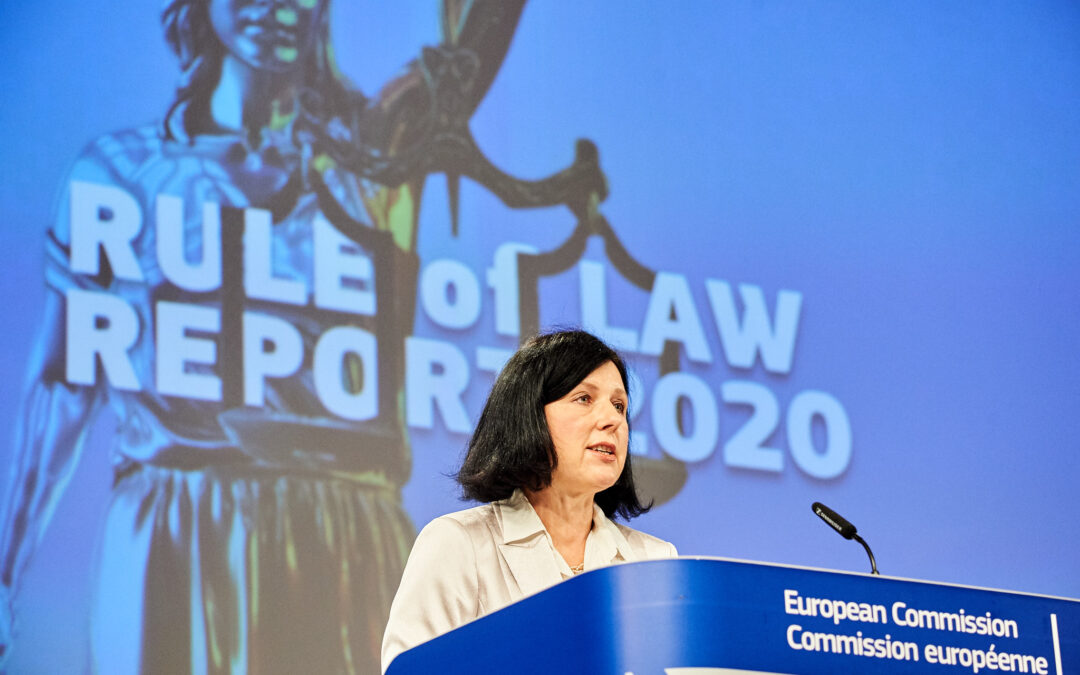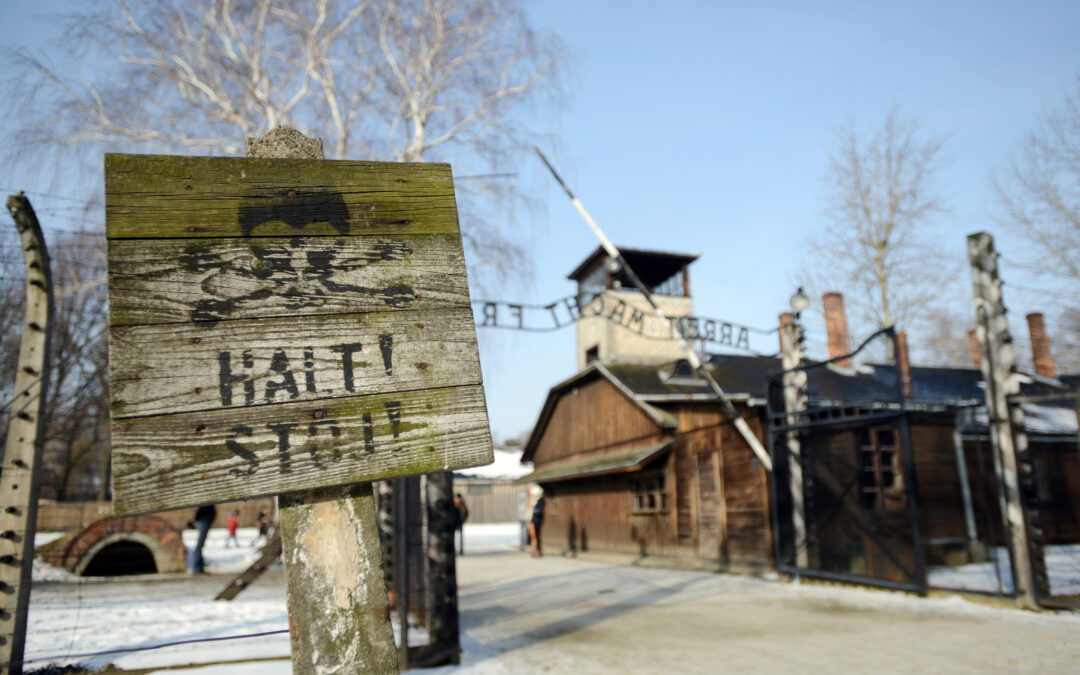The European Commission today published its first ever EU-wide report on the rule of law, examining the situation in each of the bloc’s member states.
In its section on Poland, the commission raises a number of concerns over judicial reform, media pluralism, pressure on NGOs, and a government-led anti-LGBT campaign.
1/3 We present the first ever Rule of Law Report today! Democracy, rule of law and fundamental rights are the foundations on which everything else is based in the EU: our rights, the freedom of the press or the independence of the judiciary. @dreynders pic.twitter.com/tbBxZKphno
— Věra Jourová (@VeraJourova) September 30, 2020
Justice system
“Poland’s justice reforms since 2015…have raised serious concerns, several of which persist,” writes the European Commission in the very first words of its country report on Poland.
“The reforms…have increased the influence of the executive and legislative powers over the justice system and therefore weakened judicial independence,” it continues, referring to the controversial and contested overhaul of the judiciary implemented by the Law and Justice (PiS) government.
The commission notes concerns over the eroded independence of a number of institutions, including the Constitutional Tribunal, Supreme Court and the National Council of the Judiciary (KRS), which is responsible for nominating judges.
Following PiS’s reforms, the KRS is now “composed mainly of politically appointed members”, notes the report. It points out that the Supreme Court has found the KRS not to be independent and ruled that judges appointed by it should not be allowed to adjudicate cases.
This interpretation was, however, rejected by the Constitutional Tribunal, which itself is filled largely with PiS nominees. In April this year it sided with the government in a ruling on the independence of the KRS.
The commission also raises concern over the new disciplinary chamber of the Supreme Court created by PiS, which the court itself has found in three rulings “not to be independent within the meaning of EU and national law”.
Its powers have also been criticised by the Venice Commission, an expert body on constitutional law that advises the Council of Europe (an organisation separate from the EU).
“The disciplinary regime…has raised concerns that it lacks appropriate safeguards to protect judicial independence,” notes today’s report. This led the commission earlier this year to refer Poland to the Court of Justice of the European Union (CJEU) and request interim measures against it – which the court approved in April.
Separately, the European Commission launched its latest round of infringement proceedings against Poland in April, on the basis that the new “disciplinary system for judges can be used for political control over the content of judicial decisions”.
In its new report, the commission also notes that the government’s judicial changes have not appeared to improve the efficiency of courts, as it was claimed they would.
In fact, “there was an increase in the estimated time needed to resolve litigious civil and commercial cases, as well as a deterioration of the rate of resolving such cases”.
The commission also cites polling showing that there is a decreasing perception of judicial independence among the Polish public. One survey earlier this year found that a growing majority see the government’s judicial policies as an attempt to violate the rule of law.
Finally, the commission’s report “raises particular concern” at the fact that PiS has fused the roles of justice minister and prosecutor general. This “giv[es] rise to concerns that political considerations could have an impact on the conduct of criminal proceedings”.
Before the report was officially published today, Poland’s deputy justice minister, Sebastian Kaleta, had already rejected its findings, accusing the EU of “treating Poland as a colony“.
He claimed that many of the aspects of Poland’s judicial system criticised by the commission are in fact already present in western EU member states. Earlier this week, Poland and Hungary announced that they would create their own institution to assess the rule of law in EU countries and end such “double standards”.
PiS has also argued that its overhaul of the judiciary is necessary to purge the remnants of the former communist system, which it claims were not dealt with properly after 1989. “We are still cleansing Poland of dirt,” said President Andrzej Duda earlier this year.
Media pluralism
The European Commission’s report for Poland notes concerns – expressed by OSCE election observers and the Media Pluralism Monitor – that the media regulator, though nominally an independent body, may “be subject to political influence”.
The commission also points to “a lack of regulatory safeguards limiting political control over media outlets in Poland” and says that journalists can be negatively impacted by laws that make defamation and insulting state symbols, public officials and religion criminal offences.
It also notes recent calls by the ruling coalition to reduce foreign ownership of Polish media. This “could have implications for media pluralism and for the internal market of the EU”.
In July, Jarosław Kaczyński, the chairman of the ruling party, reiterated his aim to “reponolise” Polish media, arguing that foreign (mainly German) ownership has a negative impact. However, he admitted that “international reactions” may make this policy difficult.
Civil society and LGBT rights
“New developments adversely affect the civil society space” in Poland, says the European Commission in its report. “The civic space for NGOs’ functioning has narrowed.”
It notes that “NGOs that are critical towards one or the other policy of the government are targeted by unfavourable statements of the representatives of the public authorities”.
The commission also raises concern regarding the fact that many local authorities in Poland have passed resolutions declaring themselves “free from LGBT ideology”. This “has created serious doubts as to the capacity of the local authorities to fairly distribute EU funds among NGOs”.
In July, the commission denied funds from an EU town-twinning programme to Polish communities that had passed anti-LGBT resolutions. Earlier this month, Norway’s foreign minister said her country, which is not part of the EU, would also stop giving grants to such places.
In today’s report, the commission also noted that “actions of the government aimed at LGBTI groups, including arresting and detaining some of the groups’ representatives, and smear campaigns conducted against such groups have raised concerns”.
Since early last year, the ruling coalition has led a campaign against what it calls “LGBT ideology”, which it presents as a threat to Polish values, traditions and even the state itself.
In response, there has been a rise in more radical forms of activity from LGBT rights activists, dozens of whom were arrested by the authorities earlier this year during protests against the pretrial detention of an activist accused of assault and vandalism.
Main image credit: VeraJourava/Twitter

Daniel Tilles is editor-in-chief of Notes from Poland. He has written on Polish affairs for a wide range of publications, including Foreign Policy, POLITICO Europe, EUobserver and Dziennik Gazeta Prawna.




















